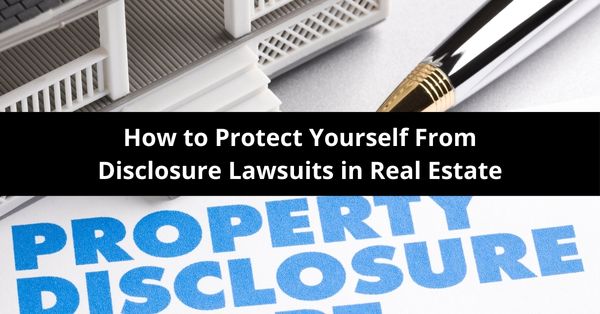This post was fact checked by Lisa Rogers, Principal Attorney at Ark Attorneys.
Real estate agents, like you, can be a target for disclosure lawsuits when a buyer realizes that there are issues with their home after closing. As a real estate agent, extra diligence is needed to help you avoid legal issues, and there are several ways to do this. And it starts with looking at your state’s real estate disclosure laws, and familiarizing yourself with federal real estate disclosure laws.
While federal real estate disclosure laws apply everywhere in the US, states can vary.
A few examples are:
- Federal law requires sellers to disclose the presence of any lead-based paint if the home was built before 1978.
- In New York, the seller can pay $500 to not disclose certain issues, but not all. For example, the seller still needs to disclose the age of the structure and the history of radon testing. N.Y. Real Prop. Law §§ 460-467
- In Wyoming, sellers do not have to make disclosures, but real estate agents do. Wyoming Code 33-28-303
- In Vermont, if a seller tells you not to disclose a material defect, you must quit or you could lose your license. 26 V.S.A. § 229
Disclosure, in the context of avoiding a lawsuit in real estate, means informing the buyer of any property defects, or other information that could impact their decision to purchase a property like previous renovations and upgrades. Other disclosures can include infestation issues, mold, and water damage. If you aren’t sure if a defect should be disclosed, always err on the side of disclosing to protect yourself from getting sued.
Other ways you can help protect yourself from disclosure claims include:
- Knowing your state’s real estate disclosure laws.
- Write down any information the seller provides to the buyer, like if they answered any questions about the condition of the property.
- And send a follow up email to all parties to leave a paper trail of the conversation.
- Don’t complete disclosure forms on behalf of a seller.
- Follow up any telephone conversations with a quick email that chronicles the conversation.
- Recommend in writing that your clients get a home inspection and note whether or not they took your advice.
- Document any issues you’ve noticed, or any research you’ve done on the property.
- Date and initial the document, and ask your client to do the same.
- Put all disclosures in writing on either state required disclosure forms or a Residential Real Property Disclosure Report.
- Review the seller’s disclosure form to verify that all questions are answered.
- Disclose material facts or defects that you are aware of, even if the seller does not.
- If something looks or feels wrong, ask about it and record the answers that are given.
- Date and initial the document, and ask your client to do the same.
- If your client will not, scan and email a copy with a cc to yourself and mention they need to sign the document still.
- Avoid taking on difficult clients when possible, and if you are able to, fire any clients who ask you to do anything illegal or unethical.
By using these strategies, you can help limit your risk of being sued because of real estate disclosure claims. As a real estate agent, communication and documentation (as well as these other strategies) will save you time, money, and allow you to move onto your next sale.

